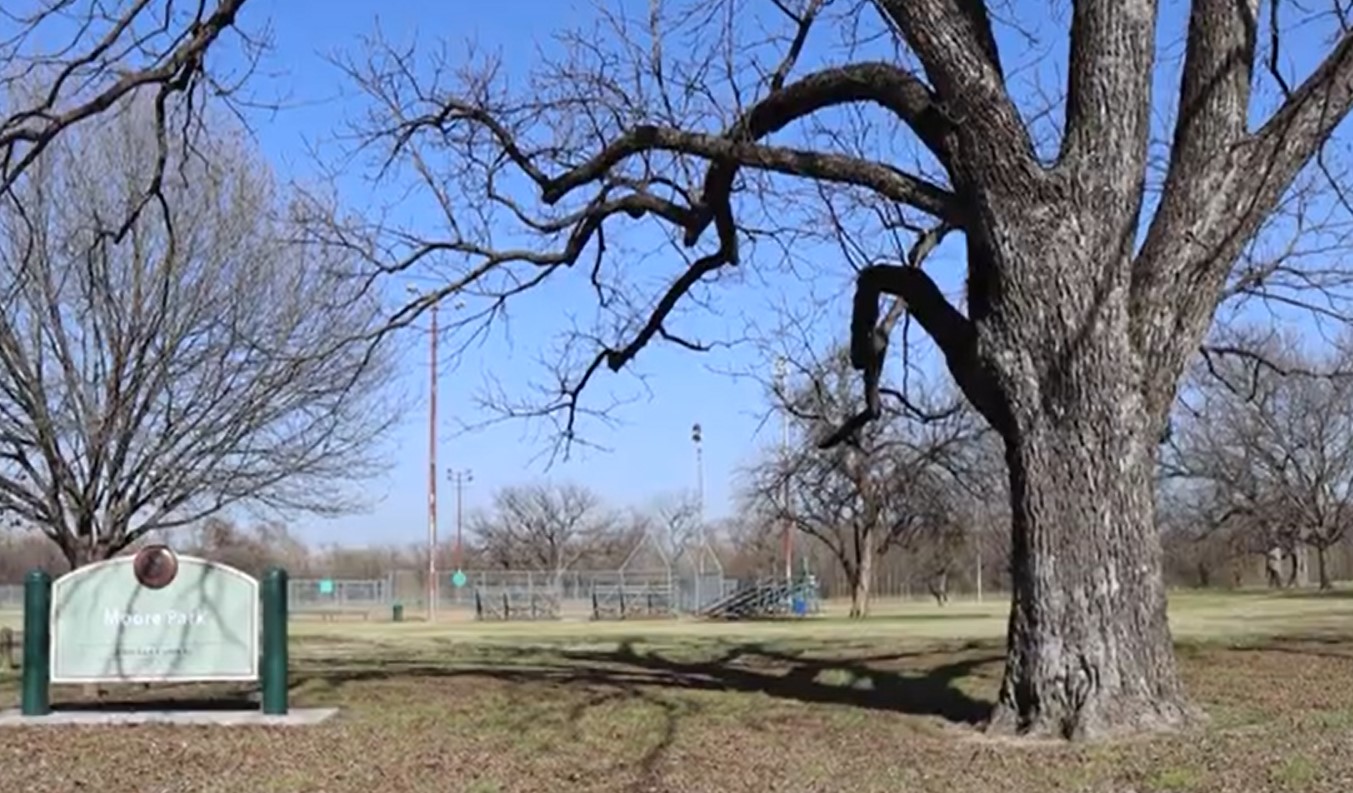Oak Cliff Tree Grove Receives Historic Protection


Published November 17, 2023, By JULIE THIBODEAUX
A grove of majestic trees that provided respite for the Black community in segregated Dallas is now protected into perpetuity, thanks to the city of Dallas and the Texas Historic Tree Coalition.
A dedication ceremony was held earlier this month for the Big Tree Grove at Moore Park, at 1900 E. Eighth St. in East Oak Cliff.
The 16 trees on the south bank of Cedar Creek, include 14 pecans, a bur oak and a bois d’arc, all estimated to be at least 125 years old, but speculated to be older.
The grove is one of seven sites the Texas Historic Tree Coalition submitted in October for historic designation by the Dallas City Council. Six sites were approved, making them among the first trees to be deemed historic since the city created the designation in 2018.
Other trees that received the designation this fall include the live oaks and cedar elms that line Dealey Plaza and the post oaks at Pioneer Park, along with the Big Spring Bur Oak, the California Crossing Comanche Marker Tree, where Texans crossed on their way to the California Gold Rush, and the Cherokee Bur Oak, the centerpiece at Dallas Heritage Village, the city's first park. A total of 86 trees.
In addition, the West Dallas Gateway Pecan feted this spring was the first to be declared historic by the city of Dallas.
Only one application that was submitted by the Coalition was axed — the application for the Great Trinity Forest Bur Oak, once singled out by the late Dallas environmentalist Ned Fritz.
Chris McMaster, chief forester for the city of Dallas, said, unfortunately, the Ned Fritz tree falls on Dallas Utilities Property, near the levee, which is planned for a renovation.
“They basically didn't want to protect the tree that might end up having to be removed for a public safety project,” said McMaster.
PROTECTING LANDMARK TREES
All of the trees deemed historic this month by the city of Dallas, except Moore Park Grove, had been lauded in prior years by the Dallas-based Texas Historic Tree Coalition. Over the past decade, the group has recognized around 50 tree sites.
As with the Dallas designation, the trees selected by TXHTC must be deemed significant in terms of age, size and history.
While the Texas Historic Tree Coalition honor does not carry any legal weight, the Dallas designation creates deed restrictions, which can only be reversed with City Council approval.
McMaster speculates that Dallas is the first city in North Texas, perhaps in the state, to officially protect trees for their historic value via a City Council vote.
“The tree becomes permanently protected,” said Marion Lineberry, president of the Texas Historic Tree Coalition. “Nobody can come in and tear down a protected tree. It requires approval of the City Council in order to do anything to trees that have been protected.”
Phil Erwin, chief arborist for the city of Dallas, clarifies while the Council cannot remove the historic designation once made, they can still authorize the removal of the historic tree, but likely they will never need to.
Erwin said the Moore Park grove, as significant trees, have been protected by ordinance since 1994, when the Dallas tree ordinance was created. But the grove's new historic status creates another layer of protection.
"The historic tree status means there will never be a tree removal for the life of the tree unless it faces the scrutiny of Council's review," he said.
“We’re in new waters, which we're really proud of,” said McMaster.
In Fort Worth, the city launched its Heritage Trees program in 2009. A panel overseen by Fort Worth city forester Craig Fox decides which trees receive the designation. Currently, 65 trees have earned the title. However there is no elevated protection that goes along with it, except in terms of care, said Fox.
“In the case of a Fort Worth Heritage Tree on city-owned property, the Park and Recreation Department’s policy is to offer a greater level of care than what may be offered to a similar tree without heritage status, when feasible,” said Fox.
Marion Lineberry, president of Texas Historic Tree Coalition, park arborist Eric Wettengel, park board member Harrison Blair and chief forester for city of Dallas Chris McMaster display proclamations at Moore Tree Grove dedication on Nov. 3, 2023. Courtesy of city of Dallas.
STORIED HISTORY
McMcMaster, who also serves as a trustee for the Texas Historic Tree Coalition, nominated the Moore Park Grove for recognition.
McMaster, a history buff, had read about the city’s segregated parks and visited the Moore Park Grove. He was awed not only by the towering trees but the dramatic history they had witnessed for more than a century.
The Moore Park Grove predates the park, which was established in 1938 as the 8th Street Negro Park by the city of Dallas.
The property was first deeded to John Crockett — a three-term mayor of Dallas, lieutenant governor and Confederate Army veteran, who is now buried in Pioneer Plaza. It was later purchased by fellow Confederate vet William Cabell, who served twice as mayor. The Cabell family sold it to the City of Dallas, who turned it into a multipurpose park for the city’s African Americans.
In 2014, researchers Cynthia Mulcahy and Lauren Woods dug into the park's history and discovered it was the largest park designated specifically for use by Black residents in Dallas at the time.
“I think about the activities that went on there,” said McMaster. “All the events that took place from big band concerts to community gatherings or family reunions. There's a lot of history packed into that property. You're touching on not only some really great history, but some history that doesn't often get told."
The public green space was home to baseball games played by the Dallas Negro Amateur Baseball League and a six-hole golf course, Mulcahy said.
The park was renamed in 1940 for William Moore, an early Dallas civil rights activist who worked to advance voter registration and fought against poll taxes.
Today, South Dallas residents still enjoy the 25-acre park and its mature trees.
“What strikes you when you first go there are the Pecan trees,” said Lineberry. “Our initial thought was that it was originally an orchard, that somebody planted them there. But it turns out, they’re all just naturally growing there. These trees are native Pecans — not the kind you find at the store.”
The trunks are 40 to 48 inches in diameter and the canopies rise to 70 to 80 feet.
“When you go to the park, there’s usually a lot of people sitting under the trees,” said Lineberry.
McMaster says the trees not only provide environmental and health benefits but also a positive effect on visitors.
“They're all just massive. When you get around trees that have been around for that long, there's just something about it. I can't really put words to it — but it’s just a feeling of reverence.”
Read about more trees honored by the Texas Historic Tree Coalition in 2023.
https://greensourcedfw.org/articles/oak-cliff-tree-grove-receives-permanent-protection
